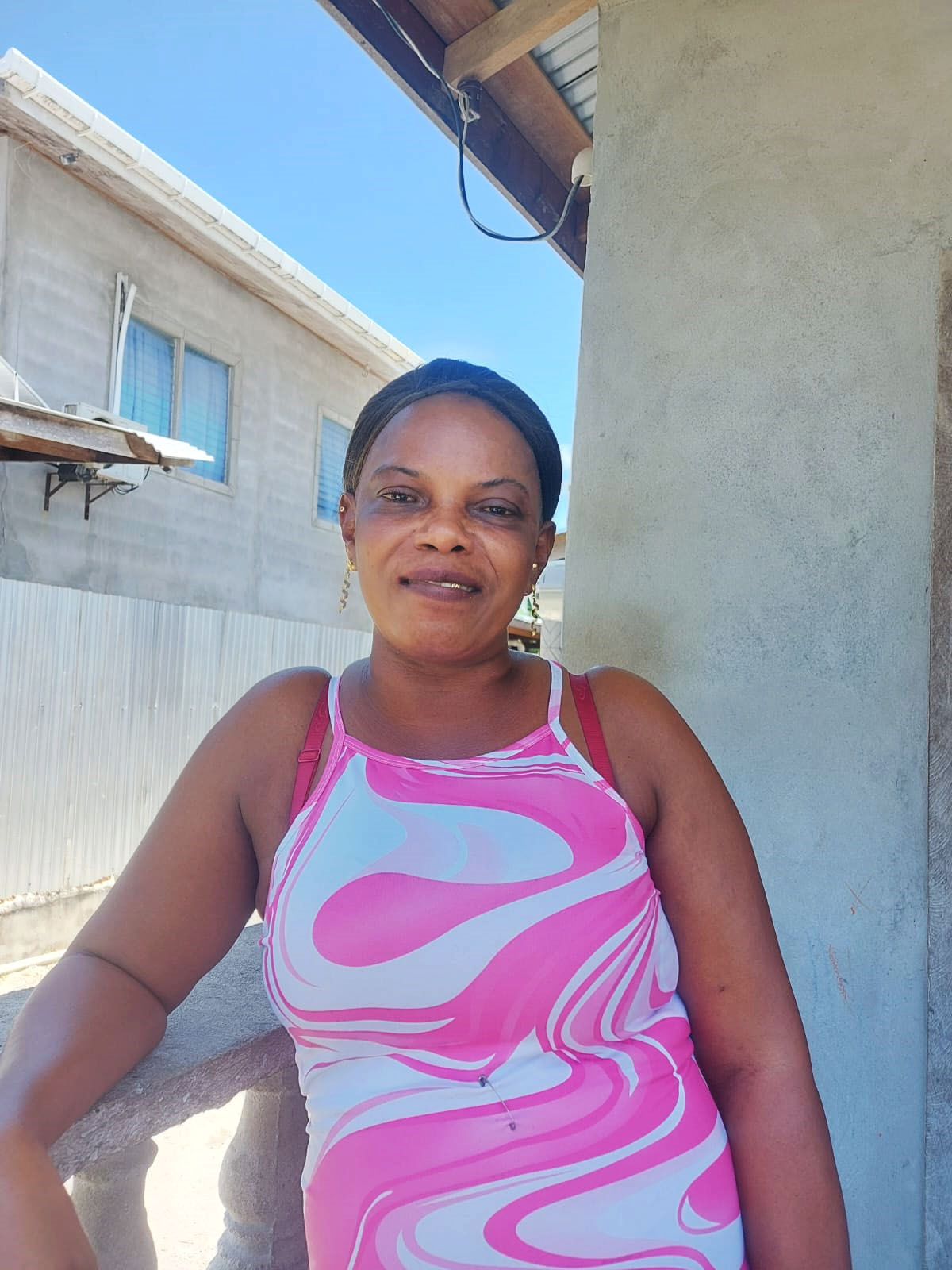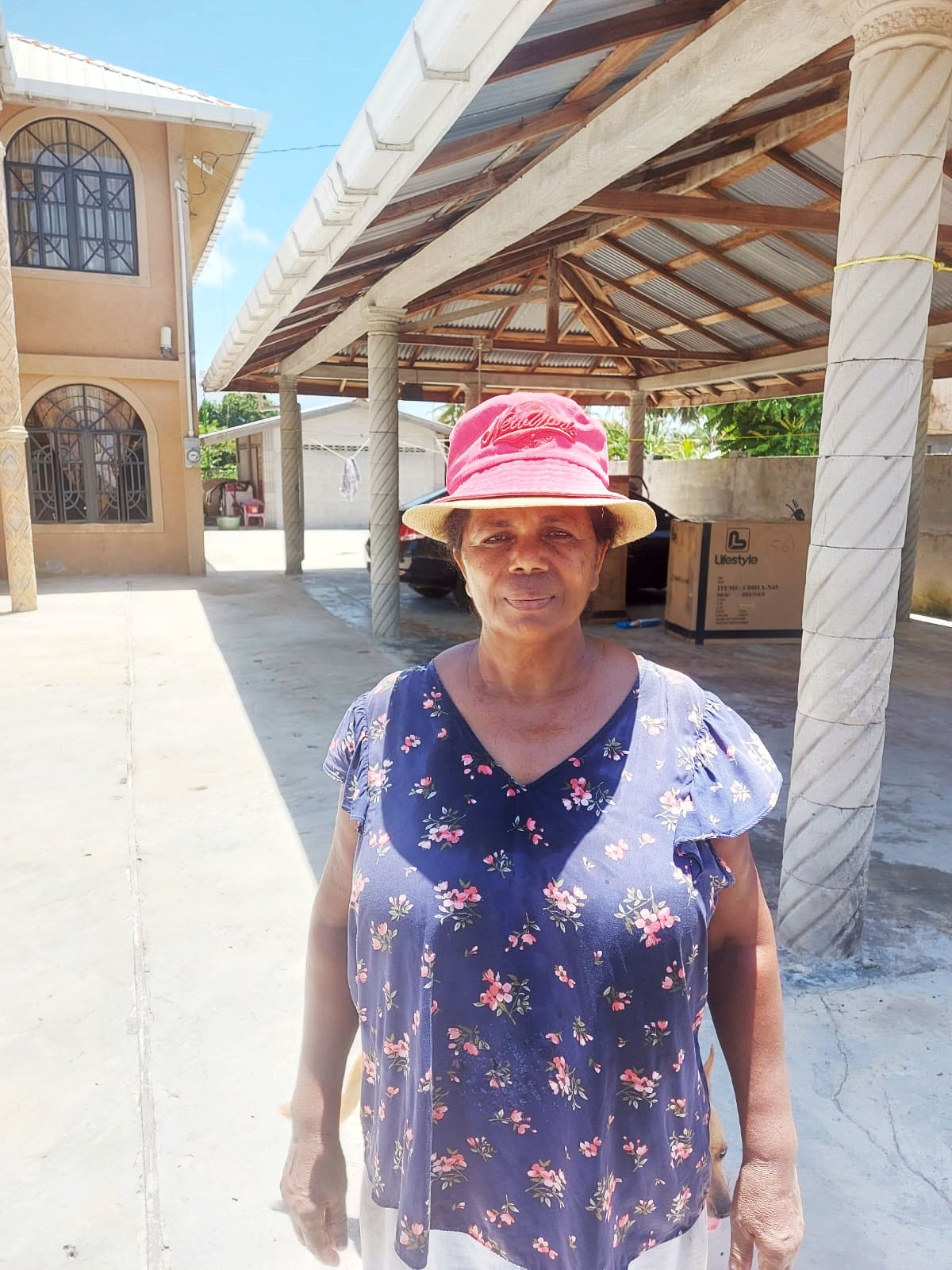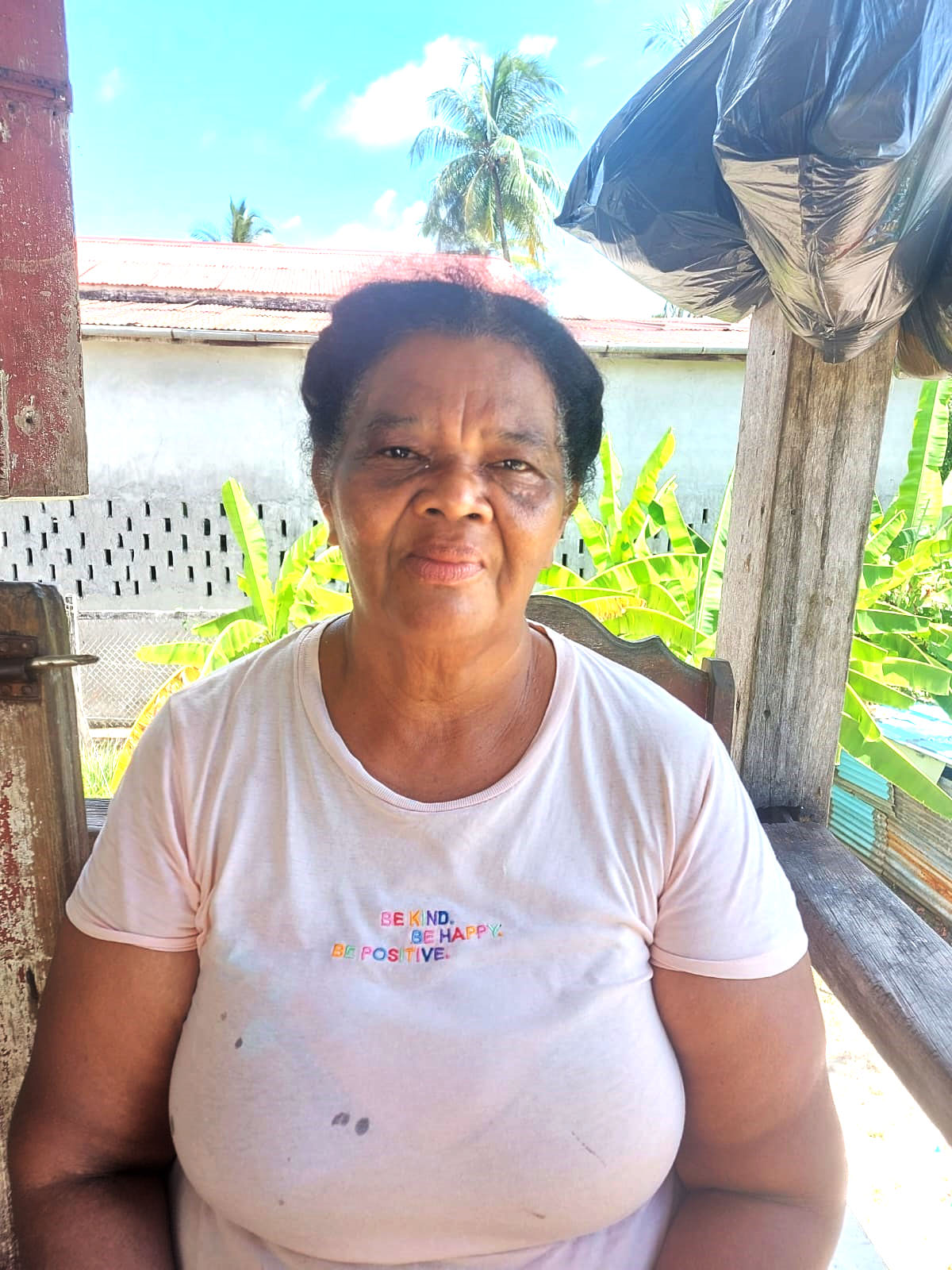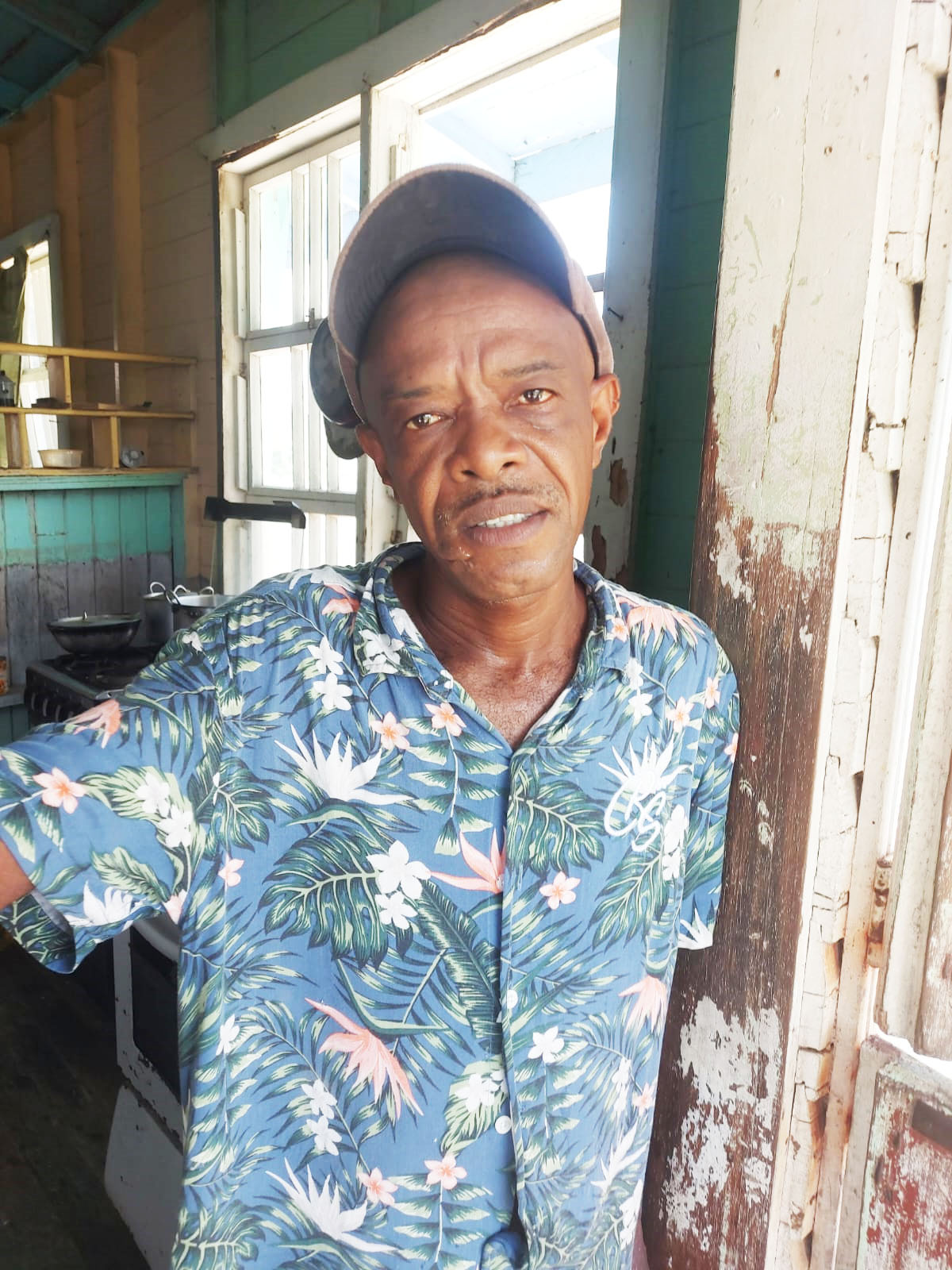Part 91
Stabroek News spoke to members of the public in Westfield, Queenstown, Essequibo Coast, in Region Two about the rising cost of living and how it is affecting them. The following are their comments:
Interviews and photos by Subhana Shiwmangal
Forraine Williams
Forraine Williams, a 48-year-old single mother said: “The cost of living is high so far and it is affecting my family and I because the salary is not increasing but the cost for the items are rising. When school closed, the cash grant I got, I had to use it up to buy things for the children, we could not have waited until school reopens. The cost of living is very high. I provide for my six children. I work as a part-time security guard and also as a part-time government worker to provide for my children. You might buy something this week and when you go back to the shop/supermarket the cost for items increases again. For example, a few months back a pound of chicken cost $480; now a pound of chicken cost $500. The prices fluctuate. A couple months back, a small Fernleaf milk cost $480; now the same pack of milk cost $560/$480 some places. Prices at the supermarket here has risen. I believe the government should provide more jobs for people in this area because most people are self-employed in the area and not always people get money. Sometimes we hustle for two /three days but the money is not nothing much since the items are high.”
Wonda Browne, a 54-year-old vendor said: “The cost of living is affecting me a lot because I’m paying more money when going to buy grocery from the supermarket. I usually have to cut down on grocery items I normally use just to cope daily. I normally sell snow cone when school is in session and when school closes, I usually sell on the road sometimes to make ends meet. I also sell fruits at the Parika Market to help provide for my family of four including, my two children and husband. My husband works security work to help me supply our two children with necessity they both need for school and for them to travel back home from Georgetown… The cost for things is expensive. For example, a couple months back a pound of sugar cost $180; now a pound of sugar cost $200. Also, a few months ago a one litre bottle oil cost $500 at the supermarkets; now at the shops in the village sells the oil for $600/$700 a bottle at some places. I think the government should visit the village and check on the prices the shops sell grocery items for. Even the transportation cost from Queenstown to Anna Regina gone up.”
Viola Persaud, a 56-year-old single parent said: “The cost of living is affecting me, yes, because I’m a single parent of two children and I also have two grandchildren living with me to feed and the cost for things has increase in the supermarkets. My daughter fully supports us while my son helps provide for us whenever he gets work. I try to monitor the grocery I purchase at the supermarket before I have to carry it back to the shelf. Then I have the utility bills to pay. The cost for everything has increase at the markets and supermarkets. For example, a couple months back a big pack Demerara Gold sugar cost $1,800 and something; now the sugar cost $2,600. A couple months back a Bakewell tennis roll cost $260; now the tennis roll cost $320. If the government could increase people’s salary that will be good because when we parents receive the cash grant for school children, the wholesalers/retailers increase their prices more as well.”
Clinton Thomas, a 55-year-old labourer said: “The cost for rice and other grocery items in the market gone up. My partner and I live alone. I’m the sole provider for the home. I clean trenches for a living. For example, a couple months ago a 10 kg Karibee rice cost $2,400; now the rice cost $2,700. Basically, the money I receive, I use it up to buy grocery items. I have my kitchen garden that supplies me with vegetables. I don’t have electricity and water bills to pay. You have to cope with the cost of living by working to get what you want.”
Doodnauth Sookram, a 50-year-old fish vendor said: “The cost of living is not affecting my family but other people more. People can’t afford to purchase food items from the market because the cost is high. Sometimes, people can’t even afford to have one meal a day while some skip meals a day just to survive or they starve. I think the cost of living should improve in some way. I’m a family of six including my four children. I’m a fish vendor, my son and my elder daughter work. We pool our resources together to figure out a way to provide for the home whilst paying the utility bills. For example, a couple months ago, a Bakewell tennis roll cost $200; now the tennis roll cost $400. Also, a 2-litre bottle oil cost $400; now the bottle oil cost $400/$600.”
Lennard Riley, a 46-year-old single parent said: “Everything gone up at the shops and market. It is really rough on my family and I. I try to cope with the cost of living by working and providing what I can for my three daughters and I.
I’m a mason and I rear livestock and do farming to cope with the cost of living. The cost for feed gone up now. A couple months back, a pack of fibre feed cost $1,000; now the feed cost $1,500. Also, a few months back a bag of cement cost $1,500; now the cement cost $2,200. The prices for food items are high; everything gone up now. I don’t think that nothing can be done about the rising cost of living, we just have to cope with it.” Nacteata Arthur
Nacteata Arthur
Nacteata Arthur, a 20-year-old housewife said: “The cost of living is affecting my family and I a lot because sometime when you work for some money, you think the money is going to do to buy some food items but the prices alone in the shop make you feel so bad.
I’m a family of four including my two babies. My husband is the sole provider for us. I try my best to save some money to help with the cost of living because the little money my husband works for can’t do to support us. Then I have to pay the utility bills and rent.
For example, a couple months back a small pack Karibee rice cost $180; now the rice cost $260. Also, a few months back a pack of Fernleaf milk cost $400; now the milk cost $900 a pack. I don’t buy the 10 kg bag rice now because it’s costly. The wholesalers/retailers should reduce the prices they sell for food items in order to help with the cost of living.”
Latoya Arther
Latoya Arther said: “The cost of living is affecting me bad because I have the flu and I went to the shop to buy an inhaler and even that is costly, along with food items.
For example, before the inhaler cost $200; now the inhaler cost $440. Also, a couple months back a 1 litre bottle oil cost $300; now the bottle oil cost $900. I’m a family of seven including my sister-in-law and her family. My husband works and provides for me alone. The shop owners should reduce prices for grocery items because when they called their prices, I would leave shock.”
Edith Paul, a pensioner said: “The cost of living is high yes in everything because the light and water bill is high. The cost for everything is high. I really depend on my pension to cope with the cost of living. I have a son along with his wife and two children living upstairs with me. They help me pay the utility bills and we stand the cost for our own grocery bill. For example, a couple months back a 10 kg Karibee rice cost $1,800; now the rice cost $2,300. Also, a small pack Demerara Gold sugar before cost $300; now the sugar cost $500. Even the cost for greens gone up. The government should increase pensioners’ monthly stipend more.”
Marlon Jones
Marlon Jones, a 46-year-old single father said: “Well the cost of living is a little tight for me because I’m a single father of two children to look after. The mother went away and left them with me. I do body works to provide for my children.
Then my children goes to school. The cost for groceries is high. Whenever I get a little work, I try to save the money to provide for my children, in case I don’t get any other work. For example, a few months ago a pound of potatoes cost $160; now the potatoes cost $200. Also, a 1 litre bottle oil before cost $500; now the oil cost $1,000. The government should reduce the water and electricity bills more. At least it will help me to see my way a little more.”













